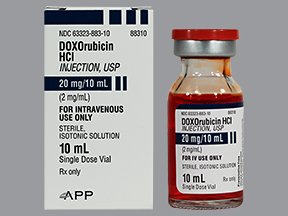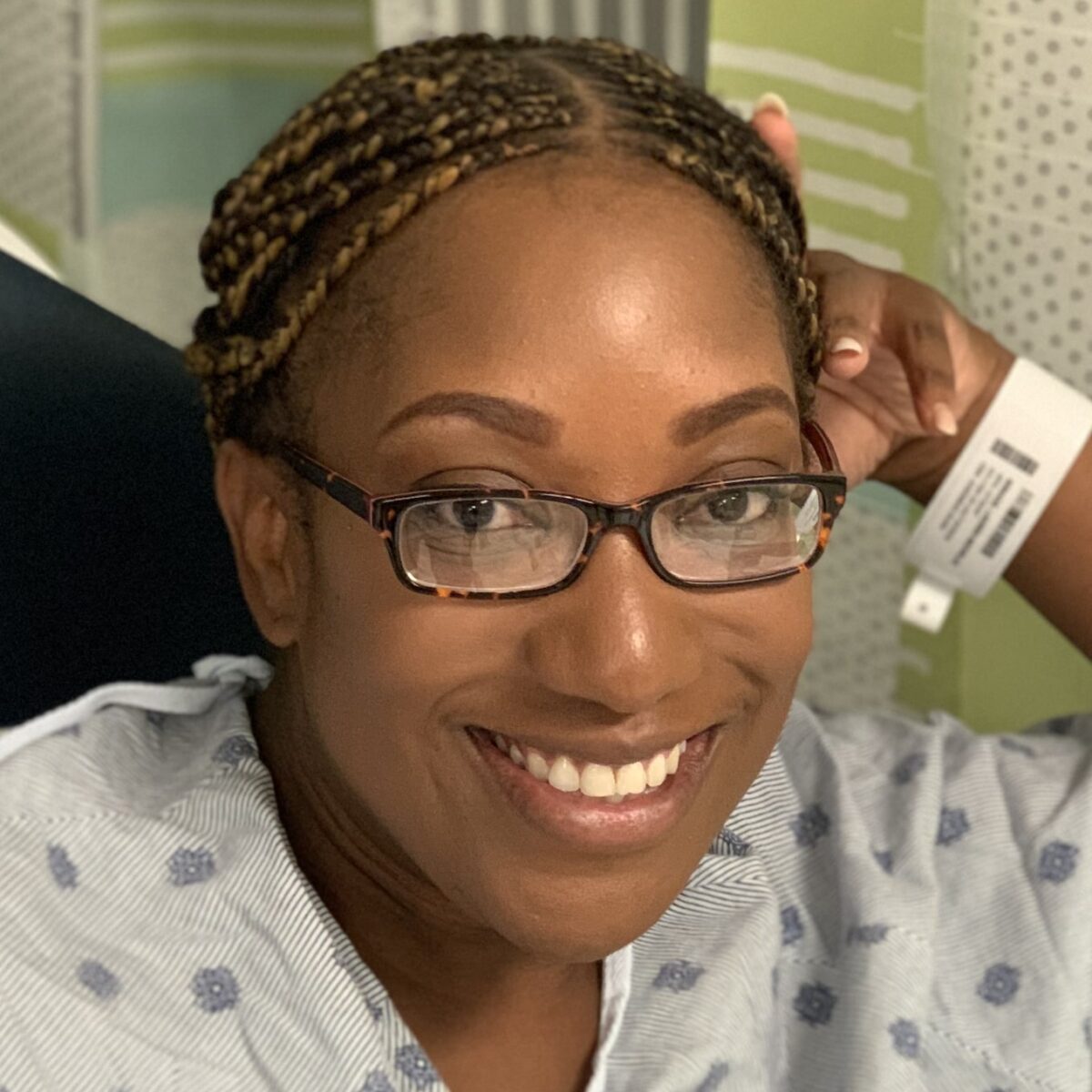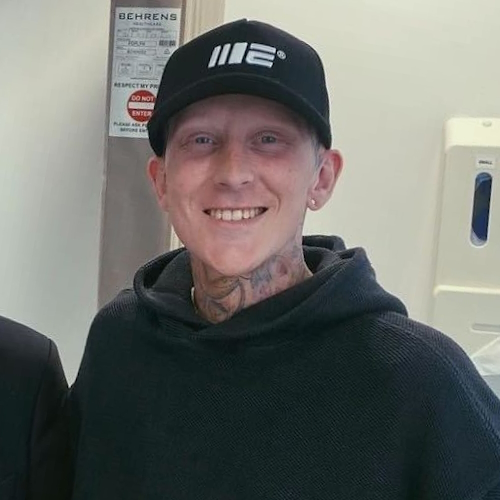Doxorubicin (Adriamycin) Side Effects & Patient Stories
Doxorubicin is a type of chemotherapy drug used in many different cancer treatments, including breast cancer, Hodgkin’s lymphoma, leukemia, and sarcoma.
Below, you’ll find some information about doxorubicin (Adriamycin), highlighted patient quotes, and a full list of our patient experiences with the drug.

What is doxorubicin (Adriamycin)?
Doxorubicin (Adriamycin) is a common chemo drug that goes by many different names. Originally, scientists named the drug “adriamycin” after the Adriatic Sea. Then, the compound was renamed “doxorubicin.” However, many people know this drug by its nickname, given by patients and nurses who have a love/hate relationship with this life-saving compound: The Red Devil.
Why is it called “The Red Devil?”
Take one look at it, and you’ll understand why — in its liquid form, doxorubicin is a bright red. We’re talking Kool-Aid, too-red-to-be-real red. In fact, the color is so intense that the first couple of times you go to the bathroom after it’s administered, you’ll probably see red in your urine. Don’t freak out! This is a perfectly normal side effect — but be sure to ask your chemo nurse about it if you’re concerned.
So we know where the “red” half of the nickname comes from, but what about “devil?” While doxorubicin is great at blasting away tumors, it can leave a lot of damage in its wake. It’s partially synthetic and based on the bacterium Streptomyces peucetius, and it damages DNA (by design) and prevents cells from fixing themselves.
Doxorubicin is a vesicant, or “a chemical that causes extensive tissue damage and blistering if it escapes from the vein.” Nurses have to be specially trained to handle doxorubicin in order to avoid injuring themselves or others with the drug. When you’re receiving this treatment, your chemo nurse will be right by your side to monitor how things are progressing.
Doxorubicin also has some nasty side effects, and most patients experience at least some of these. Short-term side effects in include red urine (for 1-2 days after treatment), hair loss or brittle hair, and mouth sores. Nausea, vomiting, and fatigue also come with the territory. In women, doxorubicin can result in amenorrhea (the menstrual cycle stops).
One of the more serious short-term side effects are low red and white blood counts. Your oncologist may recommend additional treatment to raise white counts. A long-term concern is infertility, which can affects men and women. Your doctor may be able to provide resources about preserving eggs or sperm before treatment.
Another serious long-term side effect is potential heart damage, which can occur up to 8 years after chemo has ended.
But there’s hope. In 2020, a research team in the Netherlands began testing two safer versions that reduce cardiac risk. Katerina Gurova of the Roswell Park Comprehensive Cancer Center in Buffalo, New York is excited about the new research. “We’re learning more about how to make these widely used drugs less toxic.”
Although doxorubicin can be damaging, most people get through treatment without developing serious issues. Talk to your doctor about your risk level if you are worried about potential side effects from doxorubicin.
Breast Cancer Stories

Margaret A., IDC & DCIS, 2B
“I didn’t really feel a whole lot during the treatment. The Adriamycin-cyclophosphamide was actually fine. Most people actually say that’s the harder one and I did not feel many side effects. I really think I was lucky that the AC didn’t hit me that hard.
It’s just this feeling of fuzziness in your head that you have and the queasiness in the stomach. That and then some fatigue so just not feeling like I really wanted to get out of bed and do much was how I felt.”

Tina C., Ductal & Lobular Carcinoma In Situ, 3A, ER+
“I did four rounds of Cytoxan and Adriamycin, or the Red Devil, which is the really tough kind. They have to test your heart just to make sure it’s strong enough before they give you that stuff.”
Hodgkin Lymphoma Stories

Lisa S., Classical, 4A
“What’s ironic is, I never actually lost my hair. That’s super rare because I heard the adriamycin is 99-percent supposed to cause hair loss. I guess I didn’t have to buzz it, but oh well. No one could’ve known.”
Leukemia Stories

Lauren J., Acute Lymphoblastic Leukemia (ALL)
“The red devil made me very nauseous. I dealt with it via ginger chews. I chewed a lot of ginger chews. My mom went and bought me bags and bags. I also did a lot of smoothies that contained ginger, as well.
The part that freaked me out is that it turns your urine that ugly color, a red-orange kind of color. I remember I was so open on my Facebook page, I took a picture of it in the little urine hat and being like, ‘Y’all, look at this! What is happening to me?'”
Sarcoma Stories

Demi D., Desmoid Tumor
“I did the IV chemo for almost a year. Everything was good. I was continuing scans throughout the entire process. The cancer wasn’t shrinking, but it was losing circulation. The cancer was dying. We were having pretty good results, but I reached my limits on Adriamycin.”
All Doxorubicin Patient Experiences
Francina B., Breast Cancer, Stage 2B
Symptom: None
Treatments: Surgery (lumpectomy, removal of cancerous sentinel nodes), chemotherapy, radiation
Lauren B., Breast and Colon Cancer, Stage 4
Symptoms: Lump in left breast that grew; strange appearance of nipple
Treatment: Surgery, chemotherapy, radiation therapy, hormone therapy, complementary treatments
Joe F., Desmoplastic Small Round Cell Tumors (DSRCT)
Symptoms: Mild abdominal pain, fatigue
Treatment: Surgery, chemotherapy, radiation
Callan R., Testicular Cancer, Stage 3
Symptom: Lump in right testicle
Treatments: Chemotherapy (cisplatin, doxorubicin, BEP, GemTaxol, TopCaT), surgery (orchiectomy), clinical trial (BNT142)
Chance O., Triple-Negative Breast Cancer, Stage 2, BRCA1+
Symptom: Lump on breast
Treatments: Chemotherapy (doxorubicin, cyclophosphamide, paclitaxel, carboplatin), surgery (double mastectomy), radiation, radical hysterectomy (preventive)




